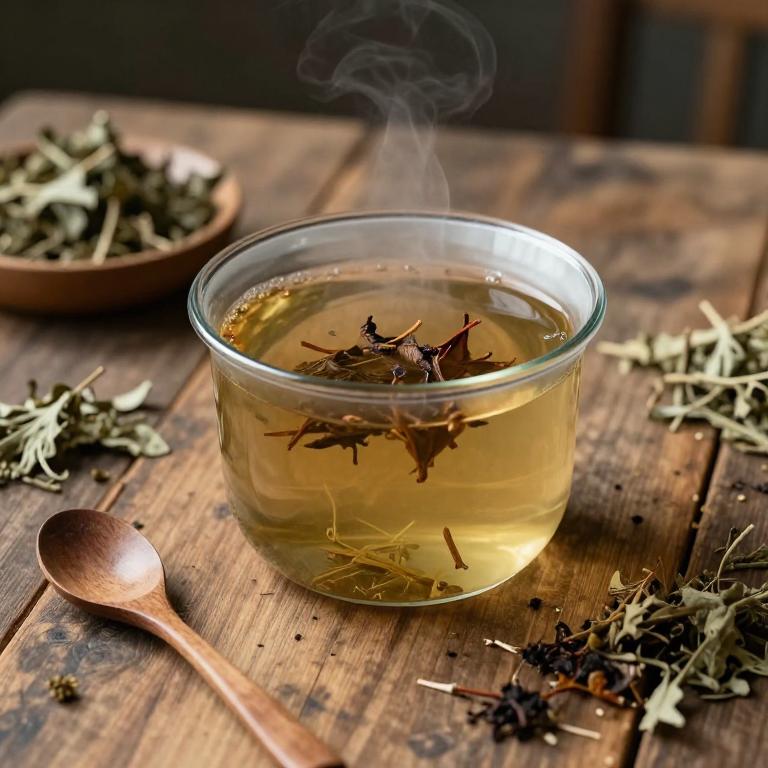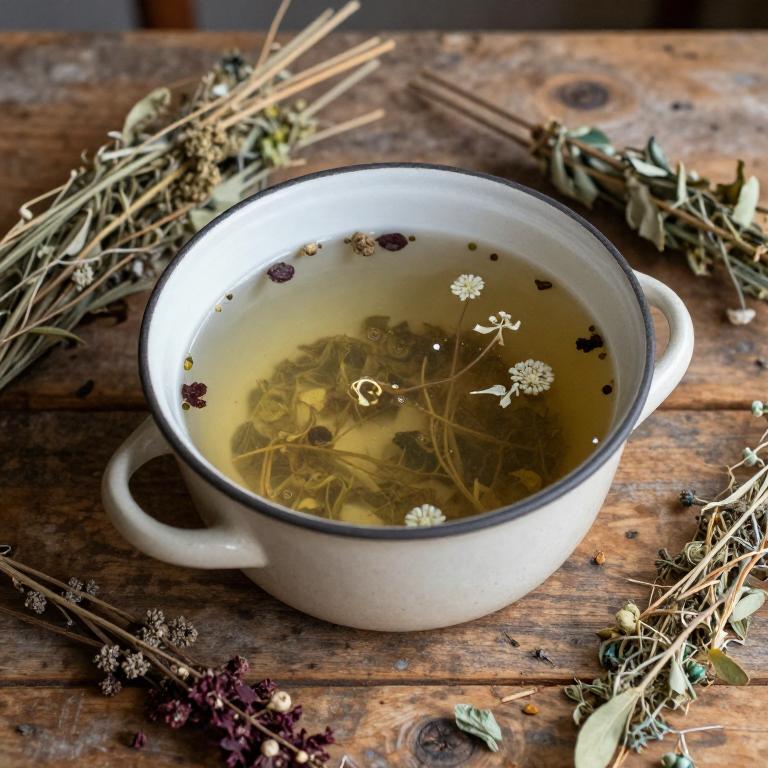10 Best Herbal Decoctions For Inflamed Gums

Herbal decoctions have been traditionally used to soothe inflamed gums due to their anti-inflammatory and antimicrobial properties.
Common herbs such as chamomile, calendula, and echinacea are often included in these preparations for their soothing and healing effects. To prepare a decoction, the dried herbs are simmered in water for an extended period to extract their active compounds. This method allows for the gentle release of beneficial compounds that can reduce swelling and promote gum healing.
When used regularly, herbal decoctions may offer a natural and complementary approach to managing gum inflammation.
Table of Contents
- 1. Salvia (Salvia officinalis)
- 2. St. john's wort (Hypericum perforatum)
- 3. Marigold (Calendula officinalis)
- 4. Stinging nettle (Urtica dioica)
- 5. Aloe vera (Aloe barbadensis)
- 6. Echinacea (Echinacea purpurea)
- 7. Oregano (Origanum vulgare)
- 8. Rosemary (Rosmarinus officinalis)
- 9. German chamomile (Chamomilla recutita)
- 10. Yarrow (Achillea millefolium)
1. Salvia (Salvia officinalis)

Salvia officinalis, commonly known as sage, has been traditionally used for its anti-inflammatory properties, making it a valuable herb in the treatment of inflamed gums.
Herbal decoctions made from sage leaves can be prepared by simmering the dried leaves in water for several minutes, allowing the active compounds such as rosmarinic acid and flavonoids to be extracted. These compounds possess antimicrobial and anti-inflammatory effects that help reduce gum swelling and redness. Using sage decoctions as a mouth rinse or topical application may provide natural relief for gingivitis and other gum inflammation conditions.
However, it is important to consult with a healthcare provider before using sage for prolonged periods, as it may interact with certain medications or have contraindications for specific health conditions.
2. St. john's wort (Hypericum perforatum)

Hypericum perforatum, commonly known as St. John's wort, is traditionally used in herbal medicine for its anti-inflammatory and antimicrobial properties.
When prepared as a decoction, it can be applied topically to inflamed gums to reduce redness, swelling, and bacterial infection. The active compounds in hypericum, such as hypericin and flavonoids, contribute to its ability to soothe gum tissue and promote healing. To prepare the decoction, dried hypericum leaves are boiled in water for several minutes, then cooled and strained.
However, it is important to consult a healthcare professional before using this herbal remedy, especially if you are on other medications, due to potential interactions.
3. Marigold (Calendula officinalis)

Calendula officinalis, commonly known as pot marigold, is a herbal remedy often used in the form of a decoction to soothe inflamed gums.
The decoction is prepared by simmering the dried flowers of the plant in water, allowing the beneficial compounds such as flavonoids and triterpenes to infuse into the liquid. These compounds possess anti-inflammatory and antimicrobial properties that can help reduce redness, swelling, and infection in the gums. Applying the warm decoction as a mouth rinse or using it to gently swish the mouth can provide relief from gingivitis and other gum irritations.
While calendula decoctions are generally safe, it is advisable to consult a healthcare professional before use, especially for those with allergies or existing medical conditions.
4. Stinging nettle (Urtica dioica)

Urtica dioica, commonly known as stinging nettle, has been traditionally used in herbal medicine for its anti-inflammatory and astringent properties.
When prepared as a decoction, the leaves and stems of Urtica dioica can be boiled to extract their beneficial compounds, including flavonoids and polyphenols. This herbal decoction may help reduce inflammation and soothe inflamed gums due to its high concentration of antioxidants and natural anti-inflammatory agents. It is often used as a complementary therapy in natural dentistry to support gum health.
However, it is important to consult with a healthcare professional before using Urtica dioica, especially if you have existing medical conditions or are taking medications.
5. Aloe vera (Aloe barbadensis)

Aloe barbadensis, commonly known as aloe vera, has been traditionally used for its soothing and healing properties, making it a valuable component in herbal decoctions for inflamed gums.
When prepared as a decoction, aloe vera can be gently simmered with other anti-inflammatory herbs such as echinacea, licorice root, and chamomile to enhance its therapeutic effects. This herbal preparation helps reduce gum inflammation by promoting tissue repair and reducing bacterial load in the oral cavity. The cooling and moisturizing properties of aloe barbadensis also provide relief from irritation and discomfort associated with gum inflammation.
While generally safe, it is advisable to consult a healthcare professional before using aloe-based decoctions, especially for prolonged periods or in conjunction with other medications.
6. Echinacea (Echinacea purpurea)

Echinacea purpurea, commonly known as purple coneflower, has been traditionally used for its anti-inflammatory and immune-boosting properties.
Herbal decoctions made from echinacea can help reduce inflammation in the gums by inhibiting the production of pro-inflammatory cytokines. These decoctions are often prepared by boiling the dried roots and leaves in water to extract the active compounds. Studies suggest that echinacea may support oral health by decreasing bacterial load and promoting tissue healing.
However, it is important to consult a healthcare professional before using echinacea, especially for individuals with allergies or those taking other medications.
7. Oregano (Origanum vulgare)

Origanum vulgare, commonly known as oregano, has been traditionally used in herbal medicine for its anti-inflammatory and antimicrobial properties.
When prepared as a herbal decoction, oregano can help reduce inflammation in the gums by inhibiting the growth of harmful bacteria that contribute to periodontal disease. To make the decoction, fresh or dried oregano leaves are boiled in water and then cooled, allowing the active compounds such as carvacrol and thymol to be released. This preparation can be used as a mouth rinse or applied directly to inflamed gums to soothe irritation and promote healing.
However, it is important to consult with a healthcare professional before using oregano decoctions, especially for individuals with allergies or those taking medications.
8. Rosemary (Rosmarinus officinalis)

Rosmarinus officinalis, commonly known as rosemary, has been traditionally used for its anti-inflammatory and antimicrobial properties, making it a valuable component in herbal decoctions for inflamed gums.
When prepared as a decoction, rosemary leaves are simmered in water to extract their essential oils and active compounds, such as rosmarinic acid and carnosic acid, which help reduce gum inflammation and prevent bacterial growth. The aromatic compounds in rosemary also promote oral hygiene by freshening breath and supporting overall gum health. Using rosemary decoctions as a mouth rinse or topical application can provide natural relief for swollen, red, or bleeding gums.
However, it is advisable to consult with a healthcare professional before incorporating rosemary into a treatment regimen for persistent gum issues.
9. German chamomile (Chamomilla recutita)

Chamomilla recutita, commonly known as German chamomile, has been widely used in herbal medicine for its anti-inflammatory and soothing properties.
When prepared as a decoction, it can be effectively applied to inflamed gums to reduce swelling and irritation. The active compounds in chamomile, such as chamazulene and bisabolol, contribute to its antimicrobial and anti-inflammatory effects. Using a chamomile decoction as a mouth rinse or applying it directly to the gums can provide relief from gingivitis and other gum-related inflammation.
However, it is important to consult with a healthcare professional before using herbal treatments, especially if there are underlying health conditions or if symptoms persist.
10. Yarrow (Achillea millefolium)

Achillea millefolium, commonly known as yarrow, has been traditionally used in herbal medicine for its anti-inflammatory and astringent properties.
When prepared as a decoction, yarrow can help reduce inflammation in the gums by soothing irritation and decreasing bacterial growth. To make the decoction, dried yarrow herb is simmered in water for about 15-20 minutes, then strained and cooled. This preparation can be used as a mouth rinse or applied topically to the affected areas.
While generally safe, it is advisable to consult a healthcare professional before using yarrow, especially for individuals with known allergies or those taking medications.